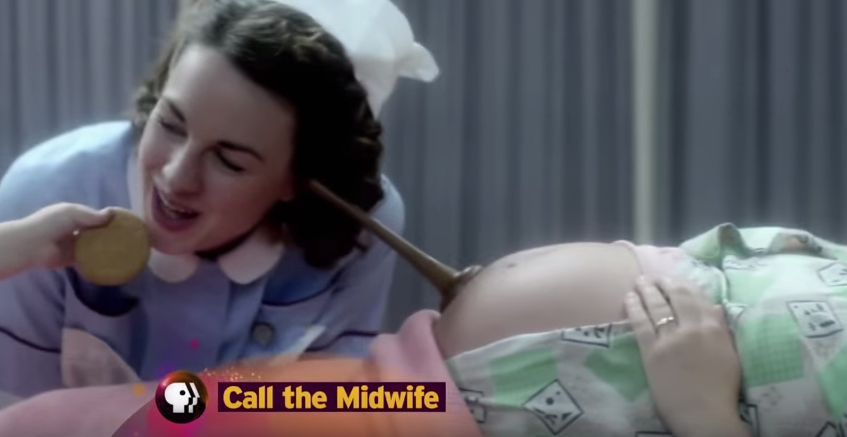
If you have ever watched the popular television series, “Call the Midwife” from the BBC, you have probably wondered about its accuracy. If you’re an avid fan of the show, then you’ve most likely pondered the sensibility of it continuing beyond the storyline laid out in the memoirs of Jennifer Worth.
Both are valid questions.
A nurse, midwife, musician and author, Worth is best known for her trilogy of books which sold millions of copies before the show was ever created. The book, which gave the show its name and main character through the first three seasons, paints a vivid image of the post-World War II London setting. The books inspired creators of the show to work tirelessly recreating the feeling of London’s East End at that time.
Beyond the setting, the medical accuracy of the show has also been applauded. The remaining nuns who Worth worked with in the Poplar district of London’s East End shared stories with The Telegraph in 2012, echoing the storylines laid out by the show’s script writer Heidi Thomas.
Walking straight up to the edge of what can be shown by a show on the BBC (PBS in America), Call the Midwife vividly depicts the squalor in which post-war London women experienced a baby boom. And it does so in a way that is in line with the medical realities of the time.
That is no small feat, nor is it done with ease. In an essay for “Journal of the Royal Society of Medicine,” actor Stephen McGann, who stars as Dr. Patrick Turner on the show, outlined the many ways in which the show accounts for medical accuracy.
From the time the script is in early development, the writing staff of Call the Midwife is busy reading medical journals and looking through medical archives for inspiration and intimate details of midwifery at that time. For areas of uncertainty, the staff consults the series’ clinical advisor, Terri Coates.
A practicing midwife and lecturer on the topic, Coates was close to Worth before she died in 2011. It was an article that Coates had written for the Royal College of Midwives that inspired Worth to write the memoir that spawned the show, and from the time the idea to make a series out of it began, Coates has played an important role in maintaining its authenticity.
“Sadly Jennifer (Worth) died just before the stories were filmed, but she had seen and approved early drafts of the scripts,” Coates wrote in an article for the BBC. “I feel that she would approve of the high standard of accuracy that we have achieved. During the long, drawn-out process of turning the books into TV scripts for Call the Midwife, Jennifer asked if I could continue as the midwifery advisor on the show to provide medical and midwifery accuracy. Now, I probably have the strangest job that ever required a midwife.”
Coates is handed early drafts of each script to approve its accuracy and provide advice on how the script can improve from a nursing and childbirth procedure perspective. Her job extends to days on set, where she oversees actor performances to ensure authenticity of their speech, the execution of the procedures and use of equipment.
The result is fascinatingly realistic depictions of birth to accompany the shows eloquently expressed dialogue. Babies on Call the Midwife are not born with hair combed or cleaned of birthing fluids. Umbilical cords are convincingly real-looking and actresses appearing as mothers are directed to portray the requisite amount of agony during the birthing process.
You Might Also Enjoy: A History of the American Midwife
In fact, when not using a prosthetic, the show uses real babies that are no more than a few days old for the scenes, giving them the effect of looking realistically newborn.
In keeping with their theme of accuracy, the show has never been afraid to depict major developments in medicine. For example, season two of the show sees the advent of nitrous oxide gas, a pain killing agent that quickly gained popularity and is still sometimes used today in place of an epidural shot. The gas is famous not for relieving the pain, but simply making the patient able to “distance themselves from it,” according to an article from Slate.
The show is so praised for its realism that it has spurned discussions among midwives and a midwifery blog on the PBS website which examines the show on a medical and fictional character basis. In an entry titled “Supporting One Another: Going Beyond the Call of Duty,” certified nurse midwife Andrea Altomaro analyzed one of the show’s plot lines and relayed its significance to the practice of midwifery.
“The relationships we have with our colleagues are so important to the work that we do as nurses and midwives. Midwifery is an extremely rewarding and mostly joyful career, but there can be moments of unbearable sorrow. It is so important to work in a practice with good relationships between partners and a philosophy of ongoing support. We can educate each other on new research, learn from one other, and be there for each other through the joys and the sorrows that are inevitable in midwifery,” she wrote.
Where Will the Show go From Here?
Call the Midwife took some flak for continuing past its season three finale, in which Jenny Lee (the onscreen version of Jennifer Worth) rides off into the sunset with her eventual husband, never to return. Not only is it the end of the stories inspired by Worth’s book, but lead actress Jessica Raine, who played Lee, wanted to move onto a new chapter in her career.
But despite the negativity surrounding the decision to continue the show, the show’s fourth season was once again successful in terms of viewership, drawing audiences of more than eight million viewers throughout the season.
Fans of the show can learn more about the details of the upcoming season five on September, 16. Producer Pippa Harris, writer Heidi Thomas and stars Jenny Agutter and Emerald Fennell will all appear at the inaugural Radio Times Festival to unveil new details about the season, which debuts with its annual Christmas special this winter.








